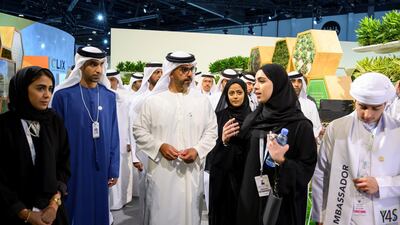Later this month, hundreds of government officials and executives from the world’s leading innovative companies will descend on the UAE capital with one thought in mind: a global response to climate change. They are convening at the invitation of the United Nations’ secretary general, Antonio Guterres, who has called climate change the “defining issue of our time”, and with the aim of synthesising policy, technology and finance into a set of measurable deliverables that heads of state and governments can ratify at the UN Climate Action Summit in New York in September.
As the host nation of the Abu Dhabi meeting, the UAE is including one additional imperative: to pitch climate change as an economic opportunity.
As with all significant undertakings, we did not arrive at this opportunity by accident or chance. The UAE is fortunate to have had founders who, from the outset, prioritised the development of social and environmental wellbeing. Their outlook created a culture whereby investment in sectors relating to the future, such as renewable energy at the beginning of the millennium, could be bolstered by policy, especially via public-private partnerships.
In line with the UAE Energy Strategy 2050, the country has pledged to increase its share of clean energy in the domestic market to 50 per cent and to reduce its greenhouse gas emissions by 70 per cent. We are initiating projects and building infrastructure at an unprecedented pace to meet these goals.
Moreover, this renewable energy is proving cost-efficient across the globe. The UAE has provided nearly $1 billion in aid for renewable energy projects in more than 35 developing countries since 2013 and in every case, we have witnessed project bids coming in at well below the cost of fossil fuel generation. We have seen the same result in commercial projects ranging from the great plains of the US to the mining hub of Chile.
The other key dimension to the new climate narrative is human health. Historically, we have advocated for climate action as a benefit to the planet, which downplays one of the most critical facts about climate change and the sources of greenhouse gas emissions: they directly affect human beings, killing four to seven million people annually, and the impact is extremely costly in many ways for individuals, communities and governments around the world.
The World Health Organisation, among other agencies, has now clearly articulated the value of tackling air pollution. If we eliminate the sources of pollution, such as outdated and inefficient power plants and factories – which are also sources of greenhouse gas emissions – the World Bank and other research institutions estimate that more than $200 billion can be saved in global health costs annually, the equivalent of up to $30 for every $1 spent. This is a purely financial calculation, with climate benefits becoming a secondary concern and it is already fuelling a surge in new commitments on air pollution.
Similarly, the business case for adapting to a policy of climate action has never been clearer. The financial toll of climate-related extreme weather conditions – including hurricanes, droughts and floods – is only growing year on year, with people losing their homes, companies incurring significant damages in terms of sales and assets, and governments going into debt to rebuild infrastructure. Globally climate disasters have cost more than $650 billion in the last three years, according to Morgan Stanley, the US multinational investment bank and financial services company. Again, we have a robust financial rationale for action. According to estimates from the UN and the International Federation of the Red Cross and Red Crescent Societies, for every $1 spent preparing for climate disasters, we could save $7 to $12 in disaster relief costs.
Cheap renewable energy, human health benefits and adaptation are immediate financial wins and should no longer be seen as offering purely long-term benefits, a disincentive when it comes to short-term action.
But what makes this new climate narrative so promising is that it is already being understood and championed by our youth. Young people across the world are most likely to agree that climate change must be our foremost global priority and, more importantly, they believe they can make a difference, from the products they buy, to the jobs and education they choose to pursue.
Accordingly, we have designed the Abu Dhabi meeting with young people at its heart. Young people, with the support of the UAE and via the UN, will engage directly in the creation of the meeting's deliverables, as well as have networking access to the ministers, CEOs and UN executives through youth-led consultations. We are confident that their beliefs and vision will make the Abu Dhabi meeting a global turning point where the case for climate change from the point of view of science, politics and business finally merge.
Dr Thani bin Ahmed Al Zeyoudi is the UAE Minister of Climate Change and Environment

